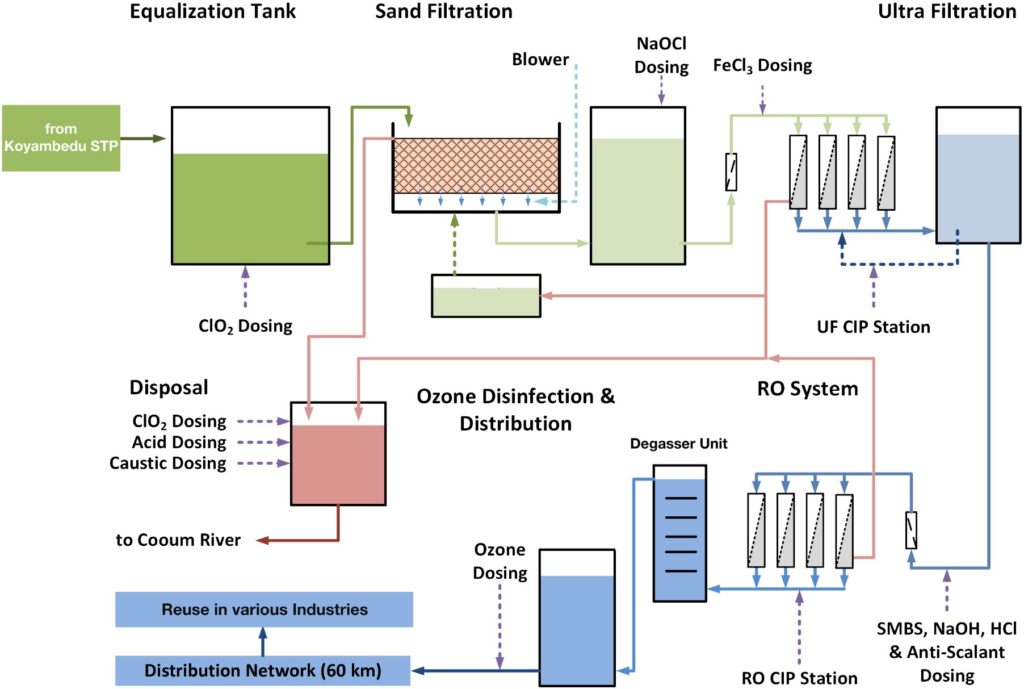Water Reuse – Boosting Supply Security and Sustainability
Water is an essential, yet finite resource. The increasing population and rapid urbanization exert an ever-increasing stress on the water resources. This poses a serious threat when it comes to ensuring water security for the future.
In this scenario, reuse of treated wastewater acts as an excellent source of alternative water supply, reducing the dependence on freshwater, thereby not only safeguarding the natural resources, but also ensuring the supply security and promoting sustainability.
If properly planned and implemented, water reuse represents a practice that provides solutions, which are sustainable from a social, ecological and economic perspective. In that context, examples from a developing country (Namibia) and an emerging economy (India) are presented.
In 1995, the city of Windhoek, Namibia had a population of 150,000, but today this has risen to over 400,000. Such a development would have been impossible to sustain without urban and in particular direct potable water reuse (DPR), which has been in successful operation for the past fifty years and upon average has covered 25% of the city’s drinking water demand.
Reclaimed water has served as a reliable and safe source with quality superior to that of the other available potable water sources (treated dam water and groundwater). Moreover, there have been no health issues that could have been attributed to the consumption of reclaimed water and for this reason, as well as the excellent information and education policy of the City of Windhoek, consumers have accepted the practice of direct potable reuse.
During the past twenty years, India has witnessed enormous industrial development. The realisation of numerous, extremely large projects (e.g. in the refining and petrochemical industry) is representative of India’s rapid industrial growth and economic development (“rise of the sleeping tiger”).
In this context, water recycling and reuse have played a vital role in securing water supplies. Whenever there is a drought and subsequently a drinking water shortage, the public supply to industry is cut and therefore the water supply has to be provided to an increasing extent by independent sources such as reclaimed water.
Simplified process flow diagram of the Chennai/Koyambedu Water Reclamation Plant
One example in this regard is the Koyambedu water reclamation project in the extremely water- stressed city of Chennai, which on 29 November 2019 saw the inauguration by the Chief Minister of Tamil Nadu of a 45,000 m3/d water reclamation plant.
Via a 60 km-long pipeline, this provides high-grade water (Ultra Filtration and Reverse Osmosis are the core process steps) to various industrial plants (large automotive production facilities, etc.) located to the southwest of Chennai (at Irungattukottai, Sriperumbudur and Oragadam). The implementation of this project helps to reduce the plants’ consumption of fresh water which will now be diverted to domestic water supply.
Economic, ecologic and social sustainability are interlinked and should form the decisive criteria for water management. Economic sustainability cannot merely mean short payback periods of three to five years.
Therefore, industry should accept longer return on investment periods in order to promote water reuse and overall sustainability that includes industrial, agricultural, urban and potable water supply reliability, which is also of great social significance.
Social sustainability is important, especially in developing countries and emerging markets, and incorporates job creation and subsequent improvements in both the health situation and overall living standards.
Photo: Potable Water Reuse – Courtesy City of Windhoek


